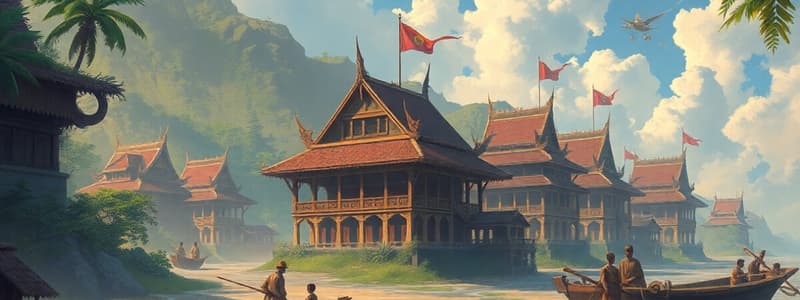Podcast
Questions and Answers
Explain the difference between indirect and direct colonial rule, providing examples from the provided text.
Explain the difference between indirect and direct colonial rule, providing examples from the provided text.
Indirect rule involved local rulers maintaining control while European powers controlled external affairs and levied higher taxes, as seen in some regions of Africa. Direct rule involved removal of local rulers and greater European control, often leading to resource exploitation and conflict, as seen in Belgian colonization of Central Africa.
How did Thailand manage to maintain its independence amidst European colonial expansion in Southeast Asia?
How did Thailand manage to maintain its independence amidst European colonial expansion in Southeast Asia?
Thailand, under King Mongkut Ohulalongkorn, promoted Western learning, fostered good relations with European powers, and utilized Britain and France as buffers against encroachment.
Explain the significance of the Sepoy Rebellion in 1857. What were the underlying causes of the rebellion?
Explain the significance of the Sepoy Rebellion in 1857. What were the underlying causes of the rebellion?
The Sepoy Rebellion was a significant uprising against British rule in India, sparked by rumors of new rifle cartridges greased with animal fat that offended religious beliefs of Hindu and Muslim soldiers. The rebellion demonstrated the growing discontent with British rule and led to increased British control.
What was the impact of the Berlin Conference of 1885 on Africa? Briefly describe its main goals and outcome.
What was the impact of the Berlin Conference of 1885 on Africa? Briefly describe its main goals and outcome.
Describe the concept of "dollar diplomacy" as utilized by the US in Latin America. How did this policy benefit the United States?
Describe the concept of "dollar diplomacy" as utilized by the US in Latin America. How did this policy benefit the United States?
What role did Ram Mohun Roy play in the movement for reform in India? What were his key objectives?
What role did Ram Mohun Roy play in the movement for reform in India? What were his key objectives?
Explain the significance of the Swadeshi boycotts in India. What were they aiming to achieve?
Explain the significance of the Swadeshi boycotts in India. What were they aiming to achieve?
Compare and contrast the "new" imperialism of the 19th century with the "old" imperialism. What were the key differences in their motivations and approaches?
Compare and contrast the "new" imperialism of the 19th century with the "old" imperialism. What were the key differences in their motivations and approaches?
What two European countries gained control of land in Southeast Asia after the Portuguese?
What two European countries gained control of land in Southeast Asia after the Portuguese?
What three countries did France gain control of in Southeast Asia?
What three countries did France gain control of in Southeast Asia?
Why were Africans excluded from the Berlin Conference in 1885?
Why were Africans excluded from the Berlin Conference in 1885?
What is imperialism? Provide a brief description.
What is imperialism? Provide a brief description.
What was the custom of sati and why did the British ban it?
What was the custom of sati and why did the British ban it?
What was Cecil Rhodes' ambitious goal for British colonization? What specific method did he propose to achieve it?
What was Cecil Rhodes' ambitious goal for British colonization? What specific method did he propose to achieve it?
Why did Ethiopia stand out as a unique case during the colonization of Africa? Which nation repeatedly attempted to challenge its independence?
Why did Ethiopia stand out as a unique case during the colonization of Africa? Which nation repeatedly attempted to challenge its independence?
What are two examples of significant resistance to imperialism in Southeast Asia mentioned in the text, and specifically who or what groups were involved in each?
What are two examples of significant resistance to imperialism in Southeast Asia mentioned in the text, and specifically who or what groups were involved in each?
Who were the Boers and what was their primary occupation in South Africa?
Who were the Boers and what was their primary occupation in South Africa?
What prompted the formation of the Muslim League in India? What was its main objective?
What prompted the formation of the Muslim League in India? What was its main objective?
Explain what the Roosevelt Corollary was and how it expanded the scope of the Monroe Doctrine.
Explain what the Roosevelt Corollary was and how it expanded the scope of the Monroe Doctrine.
Describe the cause of the Boer War and its outcome. What was the ultimate consequence for South Africa?
Describe the cause of the Boer War and its outcome. What was the ultimate consequence for South Africa?
Who was Menelik II and what was his significance in the context of African imperialism?
Who was Menelik II and what was his significance in the context of African imperialism?
Name three empires that were declining in power during the 19th century, opening opportunities for European expansion. How did their decline contribute to European imperialism?
Name three empires that were declining in power during the 19th century, opening opportunities for European expansion. How did their decline contribute to European imperialism?
Flashcards
David Livingstone
David Livingstone
The first legendary explorer to map out Central Africa.
Henry Stanley
Henry Stanley
Explorer who took control after Livingstone; worked for Leopold II of Belgium.
Indirect Rule
Indirect Rule
Local rulers keep authority under European oversight; higher taxes, less control.
Direct Rule
Direct Rule
Signup and view all the flashcards
Swadeshi Boycotts
Swadeshi Boycotts
Signup and view all the flashcards
Dollar Diplomacy
Dollar Diplomacy
Signup and view all the flashcards
Berlin Conference of 1885
Berlin Conference of 1885
Signup and view all the flashcards
Thailand's Independence
Thailand's Independence
Signup and view all the flashcards
European access to Southeast Asia
European access to Southeast Asia
Signup and view all the flashcards
Exclusion from the Berlin Conference
Exclusion from the Berlin Conference
Signup and view all the flashcards
Reasons for Madero's Revolution failure
Reasons for Madero's Revolution failure
Signup and view all the flashcards
Economic changes in Latin America
Economic changes in Latin America
Signup and view all the flashcards
Shaka Zulu
Shaka Zulu
Signup and view all the flashcards
White Man's Burden
White Man's Burden
Signup and view all the flashcards
The Raj
The Raj
Signup and view all the flashcards
Imperialism definition
Imperialism definition
Signup and view all the flashcards
US involvement in SE Asia
US involvement in SE Asia
Signup and view all the flashcards
Sati
Sati
Signup and view all the flashcards
Cecil Rhodes
Cecil Rhodes
Signup and view all the flashcards
Unique Ethiopian Independence
Unique Ethiopian Independence
Signup and view all the flashcards
Boers
Boers
Signup and view all the flashcards
Muslim League Formation
Muslim League Formation
Signup and view all the flashcards
Roosevelt Corollary
Roosevelt Corollary
Signup and view all the flashcards
Boer War
Boer War
Signup and view all the flashcards
Menelik II
Menelik II
Signup and view all the flashcards
African Nationalism
African Nationalism
Signup and view all the flashcards
Scramble for Africa
Scramble for Africa
Signup and view all the flashcards




